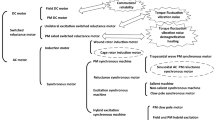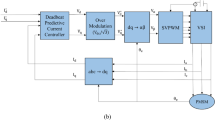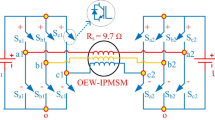Abstract
The conventional linear control methods are difficult to meet the control requirements of high-performance speed regulation of asynchronous motor due to the nonlinear and multi-variable problems of induction motor. A passive-based control method of induction motor with the full-order state observer is proposed with the Euler–Lagrange equation of motion of the induction motor. Based on the relationship between passivity and stability of induction motor, the state feedback is used for torque and speed tracking. The full-order state observer is adopted with rotor current and rotor flux as state variables, and the adaptive speed controller is designed to realize the passive-based control. The experimental results show that the errors between the estimated value based on the proposed full-order observer and the actual value of rotor current, speed and flux are small; the speed with the proposed adaptive control can reach the expected value quickly. The proposed control method can effectively meet the high-performance requirements of induction motor.










Similar content being viewed by others
References
Zhao, J., Kanellakopoulos, I.: Active identification for discrete-time nonlinear control. i. output-feedback systems. IEEE Trans. Autom. Control 47(2), 210–224 (2002)
Zhao, J., Kanellakopoulos, I.: Active identification for discrete-time nonlinear control. ii. strict-feedback systems. IEEE Trans. Autom. Control 47(2), 225–240 (2002)
Sergey, D., Mironchenko, A.: Input-to-state stability of nonlinear impulsive systems. SIAM J. Control Optim. 51(3), 1962–1987 (2013)
Alanis, A.Y., Sanchez, E.N., Loukianov, A.G.: Real-time discrete backstepping neural control for induction motors. IEEE Trans. Control Syst. Technol. 19(2), 359–366 (2011)
Duarte-Mermoud, M.A., Travieso-Torres, J.C., Pelissier, I.S., et al.: Induction motor control based on adaptive passivity. Asian J. Control 14(1), 67–84 (2012)
Wenping, C., Mecrow, B.C., Atkinson, G.J., et al.: Overview of electric motor technologies used for more electric aircraft (mea). IEEE Trans. Ind. Electron. 59(9), 3523–3531 (2012)
Wang, H., Ge, X., Liu, Y.: Second-order sliding-mode mras observer-based sensorless vector control of linear induction motor drives for medium-low speed maglev applications. IEEE Trans. Ind. Electron. 65(12), 9938–9952 (2018)
Krim, S., Gdaim, S., Mtibaa, A., et al.: Fpga-based real-time implementation of a direct torque control with second-order sliding mode control and input–output feedback linearisation for an induction motor drive. IET Electr. Power Appl. 14(3), 480–491 (2020)
Batlle, C., Dòria-Cerezo, A., Espinosa-Pérez, G., et al.: Simultaneous interconnection and damping assignment passivity-based control: the induction machine case study. Int. J. Control 82(2), 241–255 (2009)
Seleme, S.I., Rosa, A.H.R., Morais, L.M.F., et al.: Evaluation of adaptive passivity-based controller for power factor correction using a boost converter. IET Control Theory Appl. 6(14), 2168–2178 (2012)
Son, Y.I., Kim, I.H.: Complementary pid controller to passivity-based nonlinear control of boost converters with inductor resistance. IEEE Trans. Control Syst. Technol. 20(3), 826–834 (2012)
Ortega, R., Loria, A., Nicklasson, J., et al.: Passivity-based control of Euler-Lagrange systems. Adapt. Disturb. Attenuation Frict. Compens. 26(3), 75–92 (1998)
Mahmoud, M.S., Zribi, M.: Passive control synthesis for uncertain systems with multiple-state delays. Comput. Electr. Eng. 28(3), 195–216 (2002)
Ye, J., Malysz, P., Emadi, A.: A fixed-switching-frequency integral sliding mode current controller for switched reluctance motor drives. IEEE J. Emerg. Sel. Top. Power Electron. 3(2), 381–394 (2015)
Wang, J.H., Huang, L.P., Yang, X.Y.: Power control of three-phase boost-type pwm rectifier based on passivity. Proc. CSEE 28(21), 20–25 (2008)
Holmes, D.G., McGrath, B.P., Parker, S.G.: Current regulation strategies for vector-controlled, induction motor drives. IEEE Trans. Ind. Electron. 59(10), 3680–3689 (2012)
Yazdanpanah, R., Soltani, J., Markadeh, G.R.A.: Nonlinear torque and stator flux controller for induction motor drive based on adaptive input-output feedback linearization and sliding mode control. Energy Convers. Manag. 49(4), 541–550 (2008)
Barambones, O., Alkorta, P., Maria, G.D.D.J.: A real-time estimation and control scheme for induction motors based on sliding mode theory. J. Frankl. Inst. 351(8), 4251–4270 (2014)
Lloyd, S., Slotine, J.E.: Information theoretic tools for stable adaptation and learning. Int. J. Adapt. Control Signal Process. 10(4–5), 499–530 (2015)
Jiang, S.D., Liu, J.: Passivity-based control of doubly fed induction generator under grid voltage dip. Syst. Eng. Theory Pract. 34(2), 478–484 (2014)
Wu, W.J., Xue, H.: Passivity-based control strategies of doubly fed induction wind power generator without speed sensors. Appl. Mech. Mater. 380–384, 3124–3128 (2013)
Xue, H., Jiang, J.: Adaptive passivity-based control of induction motors without speed sensors. Dyn. Contin. Discrete Impul. Syst. 13(1), 1953–1960 (2016)
Xingjian, W., Shaoping, W., Pan, Z.: Adaptive fuzzy torque control of passive torque servo systems based on small gain theorem and input-to-state stability. Chin. J. Aeronaut. 25(6), 906–916 (2012)
Yanhong, L., Yanxing, L., Hanjuan, H., et al.: Passivity control of induction motors based on adaptive observer design. IFAC Proc. Vol. 46(20), 176–181 (2013)
Taoutaou, D., Castrolinares, R.: A controller-observer scheme for induction motors based on passivity feedback equivalence and sliding modes. Int. J. Adapt. Control Signal Process. 14(2–3), 355–376 (2015)
Ortega, R., Espinosa-Pérez, G., Astolfi, A.: Passivity-based control of ac drives: theory for the user and application examples. Int. J. Control 86(4), 625–635 (2013)
Zhang, Y., Yang, H.: predictive control for speed sensorless induction motor drive. Proc. CSEE 34(15), 2422–2429 (2014)
Bo, F., Zhumu, F., Leipo, L., et al.: The full order state observer speed-sensorless vector control based on parameters identification for induction motor. Meas. Control 52(3–4), 202–211 (2019)
Acknowledgements
This work is supported by National Science Foundation of China (U1704157), National Key Research and Development Program of China (2017YFB0306400), Scientific and Technological Innovation Leaders in Central Plains (194200510012), Science and Technology Innovative Teams in University of Henan Province (18IRTSTHN011) and CSC Scholarship.
Author information
Authors and Affiliations
Corresponding author
Ethics declarations
Conflict of interest
The authors declare that they have no conflict of interest.
Additional information
Publisher's Note
Springer Nature remains neutral with regard to jurisdictional claims in published maps and institutional affiliations.
Rights and permissions
About this article
Cite this article
Fan, B., Fu, Z. & Sun, L. Passive-based adaptive control with the full-order observer for induction motor without speed sensor. Nonlinear Dyn 104, 483–495 (2021). https://doi.org/10.1007/s11071-021-06290-w
Received:
Accepted:
Published:
Issue Date:
DOI: https://doi.org/10.1007/s11071-021-06290-w




